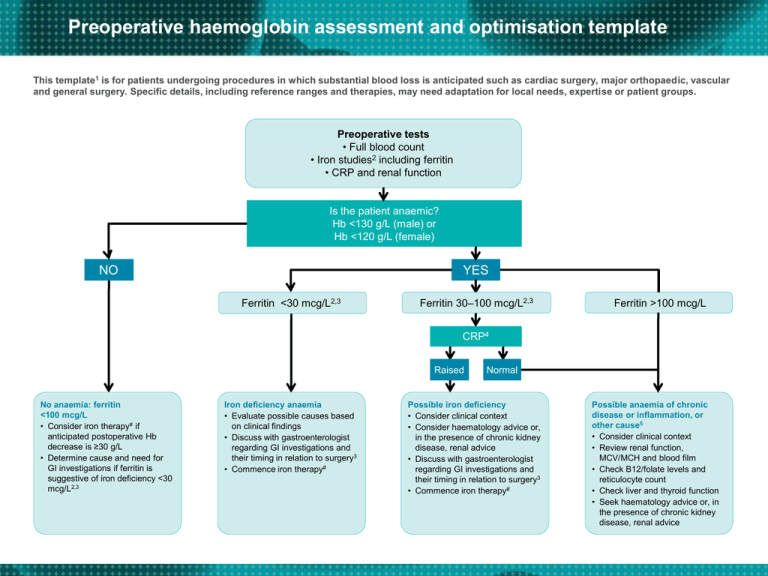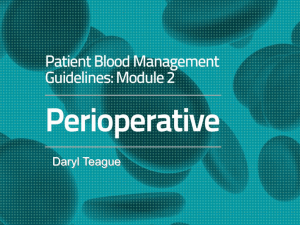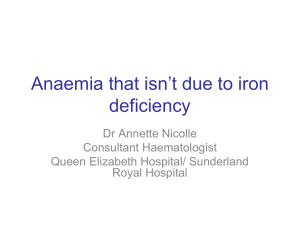Preoperative Haemoglobin Assessment and Optimisation Template
advertisement

Preoperative haemoglobin assessment and optimisation template This template1 is for patients undergoing procedures in which substantial blood loss is anticipated such as cardiac surgery, major orthopaedic, vascular and general surgery. Specific details, including reference ranges and therapies, may need adaptation for local needs, expertise or patient groups. Preoperative tests • Full blood count • Iron studies2 including ferritin • CRP and renal function Is the patient anaemic? Hb <130 g/L (male) or Hb <120 g/L (female) NO YES Ferritin <30 mcg/L2,3 Ferritin 30–100 mcg/L2,3 Ferritin >100 mcg/L CRP4 Raised No anaemia: ferritin <100 mcg/L • Consider iron therapy# if anticipated postoperative Hb decrease is ≥30 g/L • Determine cause and need for GI investigations if ferritin is suggestive of iron deficiency <30 mcg/L2,3 Iron deficiency anaemia • Evaluate possible causes based on clinical findings • Discuss with gastroenterologist regarding GI investigations and their timing in relation to surgery3 • Commence iron therapy# Normal Possible iron deficiency • Consider clinical context • Consider haematology advice or, in the presence of chronic kidney disease, renal advice • Discuss with gastroenterologist regarding GI investigations and their timing in relation to surgery3 • Commence iron therapy# Possible anaemia of chronic disease or inflammation, or other cause5 • Consider clinical context • Review renal function, MCV/MCH and blood film • Check B12/folate levels and reticulocyte count • Check liver and thyroid function • Seek haematology advice or, in the presence of chronic kidney disease, renal advice Preoperative haemoglobin assessment and optimisation template Footnotes: # Iron therapy Oral iron in divided daily doses. Evaluate response after 1 month. Provide patient information material. IV iron if oral iron contraindicated, is not tolerated or effective; and consider if rapid iron repletion is clinically important (e.g. <2 months to non deferrable surgery). NOTE: 1 mcg/L of ferritin is equivalent to 810 mg of storage iron. It will take approximately 165 mg of storage iron to reconstitute 10 g/L of Hb in a 70 kg adult. If preoperative ferritin is <100 mcg/L, blood loss resulting in a postoperative Hb drop of ≥30 g/L would deplete iron stores. In patients not receiving preoperative iron therapy, if unanticipated blood loss is encountered, 150 mg IV iron per 10g/L Hb drop may be given to compensate for bleeding related iron loss (1 ml blood contains ~0.5 mg elemental iron) Abbreviations CRP = C-reactive protein GI = gastrointestinal Hb = haemoglobin IV = intravenous MCV = mean cell/corpuscular volume (fL) MCH = mean cell/corpuscular haemoglobin (pg) 1. Anaemia may be multifactorial, especially in the elderly or in those with chronic disease, renal impairment, nutritional deficiencies or malabsorption. 2. In an anaemic adult, a ferritin level <15 mcg/L is diagnostic of iron deficiency, and levels between 15–30 mcg/L are highly suggestive. However, ferritin is elevated in inflammation, infection, liver disease and malignancy. This can result in misleadingly elevated ferritin levels in iron-deficient patients with coexisting systemic illness. In the elderly or in patients with inflammation, iron deficiency may still be present with ferritin values up to 60–100 mcg/L. 3. Patients without a clear physiological explanation for iron deficiency (especially men and postmenopausal women) should be evaluated by gastroscopy/colonoscopy to exclude a source of GI bleeding, particularly a malignant lesion. Determine possible causes based on history and examination; initiate iron therapy; screen for coeliac disease; discuss timing of scopes with a gastroenterologist. 4. CRP may be normal in the presence of chronic disease and inflammation. 5. Consider thalassaemia if MCH or MCV is low and not explained by iron deficiency, or if long standing. Check B12/folate if macrocytic or if there are risk factors for deficiency (e.g. decreased intake or absorption), or if anaemia is unexplained. Consider blood loss or haemolysis if reticulocyte count is increased. Seek haematology advice or, in presence of chronic kidney disease, nephrology advice For more information on the diagnosis, investigation and management of iron deficiency anaemia refer to Pasricha SR, Flecknoe-Brown SC, Allen KJ et al. Diagnosis and management of iron deficiency anaemia: a clinical update. Med J Aust, 2010, 193(9):525–532. Disclaimer The information above, developed by consensus, can be used as a guide. Any algorithm should always take into account the patient’s history and clinical assessment, and the nature of the proposed surgical procedure.











